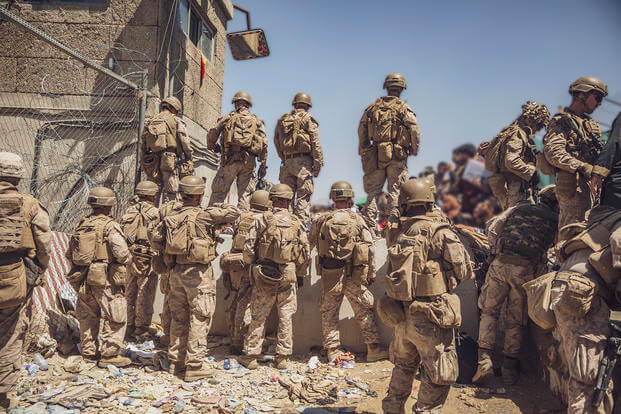As the fourth anniversary of the fall of Kabul approaches, the congressionally chartered commission studying all 20 years of the war in Afghanistan heard from veterans Tuesday about their experiences on the ground during the war -- and how they often felt disconnected from decision-makers.
During what commissioners described as an emotional session, about 20 veterans told their stories to members of the Afghanistan War Commission at the Veterans of Foreign Wars' annual national convention in Columbus, Ohio, the commission's co-chairs told Military.com in a virtual interview after the session.
"It was almost like they were talking with each other about their experiences in Afghanistan and the big existential questions that they're left with from their service," said Shamila Chaudhary, one of the co-chairs and a former State Department and National Security Council official. "What was the point of all of it? Was it worth it? How do I take care of my people now that we're out of war but we're still living through these experiences in our hearts and in our heads?"
Read Next: 'We're Going to Take Our Capital Back': Trump Calls for DC Deployments Despite Falling Crime Rates
Tuesday's session comes as the commission prepares to release its second report in the next few weeks and enter its final year of work. It also comes three days before the four-year anniversary of the Taliban overrunning the U.S.-backed government in Kabul on Aug. 15, 2021.
The commission was created by Congress in 2021 shortly after the chaotic military withdrawal from America's longest war. After the Taliban seized Kabul, the U.S. military spent the next two weeks scrambling to evacuate as many American citizens and vulnerable Afghans as possible before the last U.S. troops departed. During the evacuation, 13 U.S. service members and about 170 Afghans were killed in a suicide bombing outside the Kabul airport.
The withdrawal itself has been investigated several times over, including with a probe by House Republicans, several Biden administration reviews, and another recently announced Pentagon review by the Trump administration.
But the commission is the only official body studying the entire 20 years of the war and taking a holistic look at what went wrong.
The 16 commissioners were appointed evenly by Democrats and Republicans in Congress. In an effort to ensure an objective review, none was allowed to have been a senior official such as a Cabinet secretary or four-star military officer during the war. In addition to Chaudhary, the commission is co-chaired by Colin Jackson, who was deputy assistant secretary of defense for Afghanistan during the first Trump administration.
In its first interim report, released last year, the commission outlined how it is approaching its "ambitious" mandate to study the strategic, diplomatic and operational decisions of the war.
"When Congress proposed the idea of the commission, veterans serving in Congress and across the United States staunchly advocated for its establishment," the interim report said. "The commission feels a duty to its earliest supporters and to the roughly 800,000 U.S. military personnel who served in Afghanistan to rigorously analyze veterans' experiences in the context of our review of policy decisions."
Commissioners held their first public meeting a little more than a year ago and, from the start, vowed to keep veterans of the war at the top of their minds.
Since that meeting, the commission has solicited veterans' perspectives on its website, and has had several sitdowns with people who served in the war.
Tuesday's session at the VFW was more visceral than the previous meetings with veterans, Chaudhary and Jackson said. What started as about five veterans lined up to speak grew into about 20 recounting their experiences over the course of two hours.
"This one was very emotional, and from the heart and from the gut, rather than analytical," Jackson said. "It's not to say that this one was more important, other ones were less important. But it gets at this range of experience and the way that people react, in retrospect, to the things they went through or observed."
In particular, Chaudhary highlighted a National Guard veteran who spoke about how his experience differed from active-duty troops because those killed in action were his neighbors and his entire community was grieving with him when he returned home.
The anecdotes told Tuesday will help humanize the report and bolster a common refrain that the commission has heard throughout its work: that there was a disconnect between policymakers at the strategic level and what was happening on the ground.
"Today, I realized how high the expectations are for our work, given the level of involvement and investment that the veterans community has made in Afghanistan," Chaudhary said. "If it wasn't clear before, which it was, it's crystal clear now."
Related: 'Today We Make History': Commission Probing Afghanistan War Starts Work with Veterans Top of Mind














